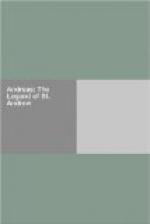The text followed is that of Grein-Wuelker in the Bibliothek der Angelsaechsischen Poesie (Leipzig, 1894), and the lines of my translation are numbered according to that edition. I have not, however, felt obliged to follow his punctuation. Where it has seemed best to adopt other readings, I have mentioned the fact in my notes.
I have compared my translation with those of Kemble and Grein (Dichtungen der Angelsaechsen), and am occasionally indebted to them for a word or a phrase.
It gives me great pleasure to acknowledge my indebtedness to Dr. Frank H. Chase, who has very carefully read my translation in manuscript; and to Professor Albert S. Cook, who has given me his help and advice at all stages of my work from its inception to its publication. To Mr. Charles G. Osgood, Jr., I am also indebted for valuable criticism.
Robert Kilburn Root.
Yale University,
April 7, 1899.
INTRODUCTION
[Sidenote: The Manuscript.]
While traveling in Italy during the year 1832, Dr. Blume, a German scholar, discovered in the cathedral library at Vercelli an Old English manuscript containing both poetry and prose. The longest and the best of the poems is the Andreas, or Legend of St. Andrew.
How did this manuscript find its way across the Alps into a country where its language was wholly unintelligible? Several theories have been advanced, the most plausible being that advocated by Cook.[1] According to this view it was carried thither by Cardinal Guala, who during the reign of Henry III was prior of St. Andrew’s, Chester. On his return to Italy he built the monastery of St. Andrew in Vercelli, strongly English in its architecture. Since the manuscript contained a poem about St. Andrew, it would have been an appropriate gift to St. Andrew’s Church in Vercelli. Wuelker’s theory that it was owned by an Anglo-Saxon hospice at Vercelli rests on very shadowy arguments, since he adduces no satisfactory proof that such a hospice ever existed.
[Footnote 1: Cardinal Guala and the Vercelli Book, Univ. of Cal. Library Bulletin No. 10. Sacramento, 1888.]
[Sidenote: Authorship and Date.]
On the strength of certain marked similarities of style and diction to the signed poems of Cynewulf, the earlier editors of the Andreas assigned the poem to him, and were followed by Dietrich, Grein, and Ten Brink. But Fritsche (Anglia II), arguing from other equally marked dissimilarities, denies its Cynewulfian authorship, and is sustained in his position by Sievers, though vigorously opposed by Ramhorst. More recently Trautman (Anglia, Beiblatt VI. 17) reasserts the older view, declaring his belief that the Fates of the Apostles, in which Napier has discovered the runic signature of Cynewulf, is but the closing section of the Andreas. There is much to be said in favor of this last theory, which would establish Cynewulf as the author of the entire work; but the whole question is far from being settled. We can at least affirm that the author was a devout churchman and a dweller by the sea, thoroughly acquainted with the poems of Cynewulf.




